北师大版模块1 Unit 1 Lifestyles lesson1
文档属性
| 名称 | 北师大版模块1 Unit 1 Lifestyles lesson1 |  | |
| 格式 | rar | ||
| 文件大小 | 7.4MB | ||
| 资源类型 | 教案 | ||
| 版本资源 | 北师大版 | ||
| 科目 | 英语 | ||
| 更新时间 | 2011-12-30 21:29:12 | ||
图片预览

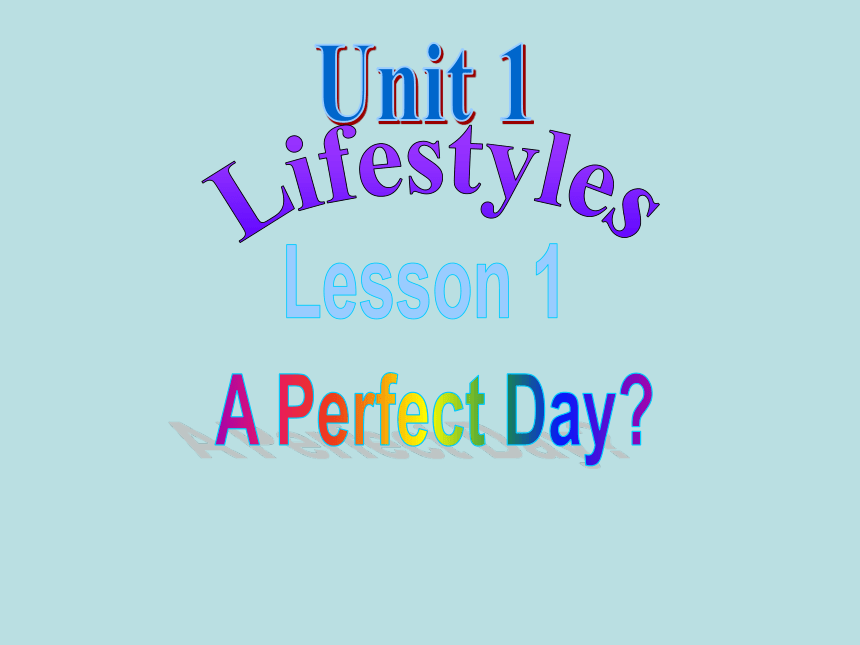
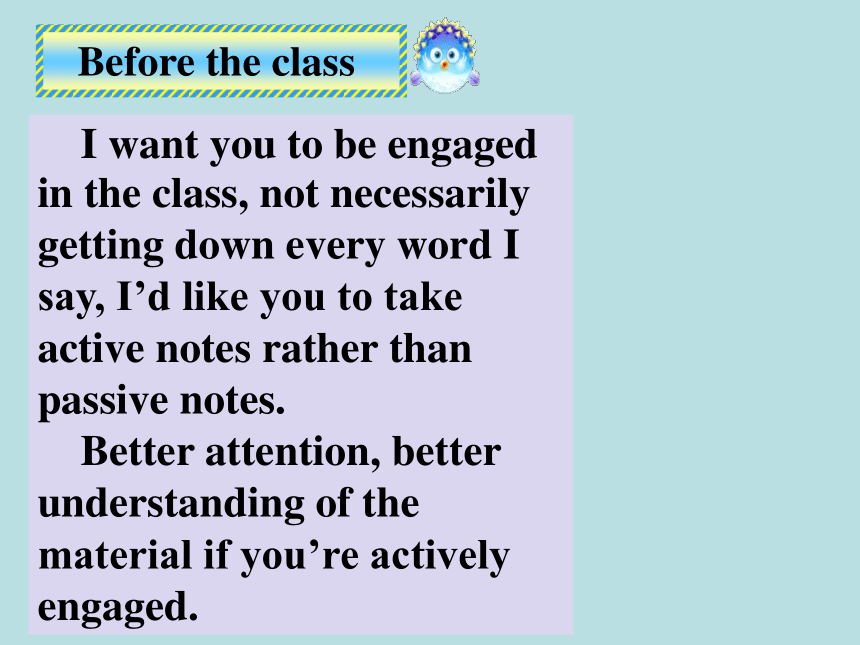
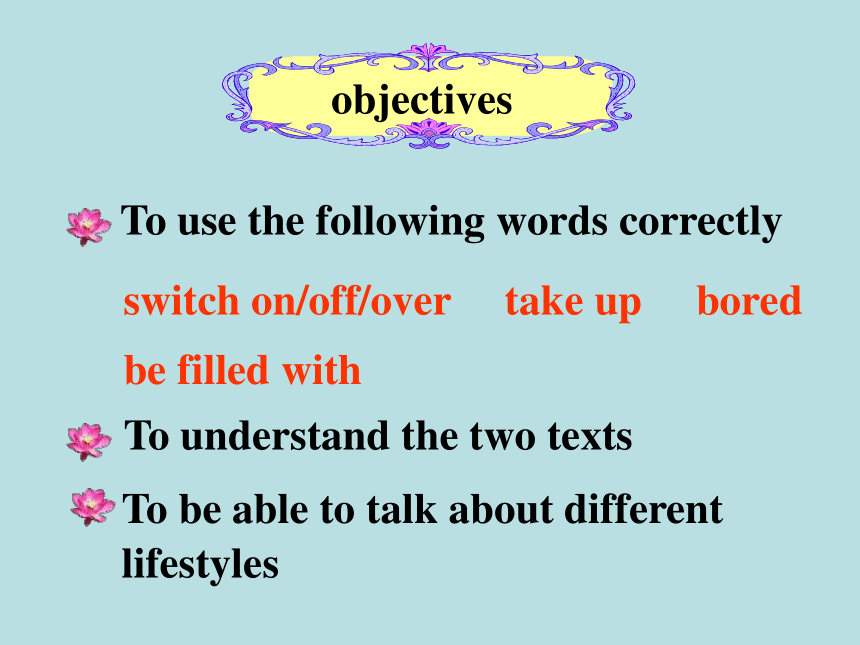
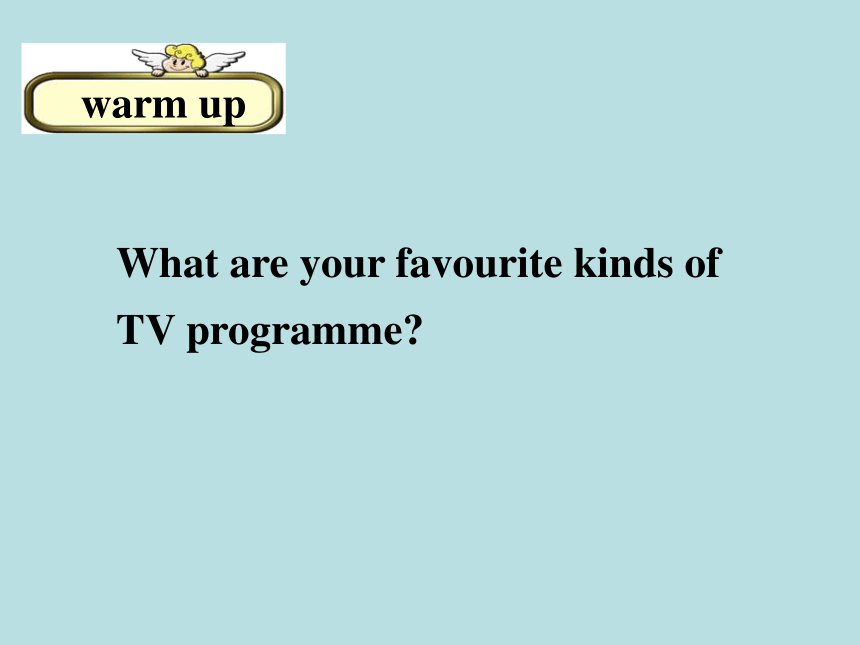



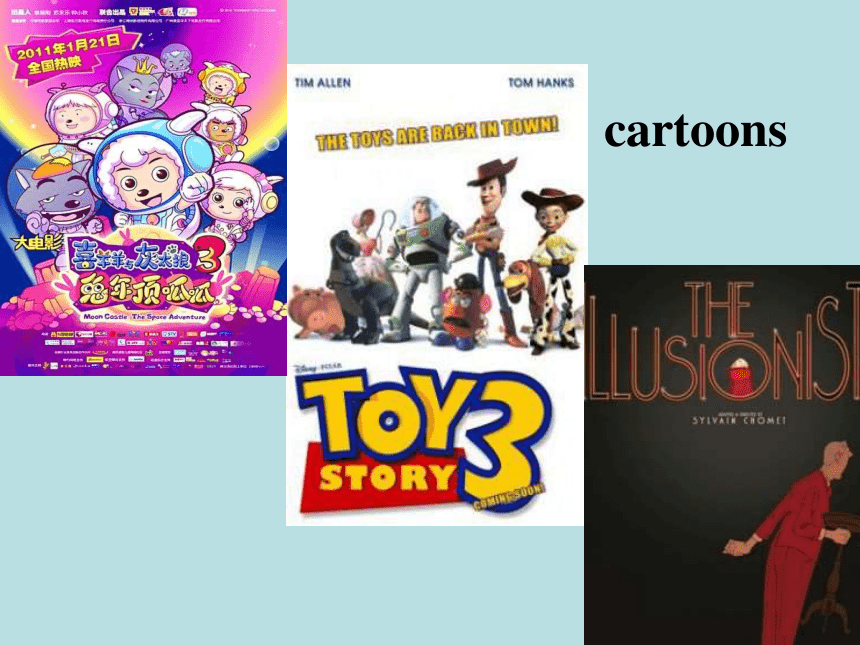



文档简介
(共76张PPT)
北师大必修模块1高一上
Before the class
I want you to be engaged in the class, not necessarily
getting down every word I
say, I’d like you to take
active notes rather than
passive notes.
Better attention, better
understanding of the
material if you’re actively
engaged.
objectives
To understand the two texts
To be able to talk about different
lifestyles
To use the following words correctly
switch on/off/over take up bored
be filled with
warm up
What are your favourite kinds of TV programme
sports programmes
the news
TV series
cartoons
game shows
films
talk shows
music programmes
Do you ever watch too much TV
How much time do you spend watching TV every day
What kind of lifestyles do you think the men in the pictures have
busy active easy
lazy exciting free
dangerous boring
interesting peaceful
relaxing stressful
Read the explanation and speak out the word it explains.
汉语是我们的母语,我们从学英语开始,就是用汉语来解释和记忆英语的。变“用汉语解释和记忆英语”为“用英语解释和记忆英语”。避免了将英语转换为另一种语言——汉语所带来的不便和时间耗费。不但提高了效率,而且久而久之,有可能在头脑中建立起两种思维系统,即在在汉语思维之外,还可以逐步建立起独立的英语思维系统。
用英语解释和记忆英语,本身就是在学习和运用英语,对提高英语语感和英语的阅读理解能力和综合运用能力很有好处。是一举多得的好方法。真正做到了用英语品味英语,越品越有味;用英语理解英语,理解更准确。鉴于本环节初次尝试此种设置,可能有些学生对英语解释不能完全理解,为降低难度,英文解释后面可进一步演示中文解释,学生可再通过中文解释回顾早读课中已预习过的单词,进一步加深记忆。
words review
a radio or television programme on which
famous guests are asked questions about
themselves, or members of the public discuss
a particular subject
n.谈话节目
talk show
to say that something is wrong or not
satisfactory
vi.抱怨,投诉
complain
a person who watches a lot of television and
does not have an active style of life
n.终日懒散在家的人
couch potato
(designed to be) light and small enough to be
easily carried or moved
adj.轻便的,手提式的
portable
a person who works a lot and finds it difficult
not to work
n.工作狂
workaholic
the part of a job which involves writing letters
and reports and keeping records
n.日常文书工作
paperwork
needing attention very soon, especially before
anything else, because important
adj.急迫的,紧急的
urgent
a paper or set of papers with written or
printed information, especially of an official
type
n.公文,文件
document
12 o'clock in the middle of the night
n.午夜,半夜
midnight
feeling tired and unhappy because something
is not interesting or because you have nothing
to do
adj.厌烦的,不感兴趣的
bored
talk show
remote control
switch on
switch off
switch over
alarm clock
go off
take up
be filled with
谈话节目,现场访谈
遥控
把开关打开,接通
把……关掉,关上
转换频道,转变
闹钟
(爆竹、铃等)响
占据
充满着
Expressions
Reading Tips
在阅读时,要注意综合运用略读(skimming)与扫读(scanning)这两种方法。
略读(skimming)只看文章标题、下标题以及每个部分或者段落第一行,关注文章中反复出现的关键词。
略读时,要用充足的时间读懂段落的第一句和第二句,因为第一句往往是该段的主题句(topic sentence),而第二句往往是对前句的延伸(extension)或进一步的解释(explanation)。
通过略读把握文章大意
运用扫读(scanning)迅速浏览从第三句开始的后面部分,搜寻作者对开头两句的支持句(supporting sentences),并同时注意文章中间是否有转折词(transition),因为这些词常常会把文章的思路逆转或加入其它重要的信息。当读到段落的最后一句时,我们又要使用略读,这时必须再次放慢速度(slow down your pace)直到完全消化作者对段落的小结(conclusion),因为该小结有可能与主题句截然相反或引导读者进入下一个段落。
通过扫读寻找特定信息或特定词组
a general
idea
certain
information
titles and headings
the first and last
sentences of paragraphs
the first and last paragraphs
pictures and charts
Scan the text for
key words and phrases, dates, etc.
Do not need to
read the whole
text.
Skimming
to get
general ideas
Are the two persons satisfied with their lifestyles
Yes.
What does a couch potato refer to
A couch potato is someone who watches lots (some would say too much!) of television.
“沙发马铃薯”。它不是马铃薯的变种, 而是现代社会里的产物, 指浪费太多时间看电视的人。
A person who works very hard and finds it difficult to stop working and do other things.
He is a
workaholic.
工作迷
醉心于
工作的人
工作狂
Scanning
to get
detail information
Underline the TV programmes that
Brian usually watches.
2. Underline the kinds of work Bob
does every day.
3. Is Brian a lazy person Can you find two examples of his lazy behavior
4. What do you think “You’ve got the
world at your feet” means
5. How does Bob spend his morning and
evening
6. Why does Bob’s family complain
7. Why does Bob work so hard
the children’s programmes sport
old movies the news TVseries
meetings and phone calls, urgent matters, do my own paperwork, answer some personal e-mails, look at some documents at home, be ready for the next day’s work
Yes, Brian is lazy. For example, he watches the children’s programmes until about half-past ten. Then he gets up. He doesn’t work but his wife works and she makes his meals.
It is used in a humorous way. It means this person feels he has a successful life because he can watch anything he likes on TV.
Bob’s morning is very busy with very little time to get dressed and have breakfast and he has all kinds of urgent matters. His evening is not easy, either. He has documents to read and never goes to bed until mid-night.
6. Bob seldom has time for fun
and other activities with his
family.
7. He wants to make more
money. Besides, he gets bored
if there is nothing to do. He
likes being busy.
True or false
1. Brian watches the news at half past ten.
2. Brian’s wife goes out to work and
supports the family.
3. Bob is poor so he has to work day
and night.
4. Bob almost has no time to spend
with his family.
F
T
F
T
5. It seems that Bob prefers doing a lot of things all day to doing nothing.
6. Bob’s wife often quarreled with Bob for him doing nothing.
7. Brian takes the dog for a walk every morning.
8. Brian’s wife often complains that the money Brian makes is not enough.
T
F
F
F
Language Points
1. switch on = turn on 接通, 打开(电器)
I had nothing to do but to switch on the TV set and watch cartoon.
除了打开电视机看看动画片,我没其它的事做。
switch off = turn off 切断(电流等)
Be sure to switch off the light when you leave the office. 你离开办公室时务必把灯关掉。
switch over 转换频道, 转变
The hotel has switched over to gas for heating.
饭店已改为用煤气供热了。
Can we switch over Here is too hot .
咱们换换地方?这里太热了。
2. take up
1) 占据(时间、空间)
This table takes up too much room.
这个桌子太占地方。
Her time is fully taken up with writing.
她的时间都用来写作了。
2) 拿起,举起(物)
She took up her Boston bag and left.
她拿起她的手提包走了。
3) 开始(工作,产生兴趣等,尤其指做以前从未做过的事,或作为消遣的方式)
He took up Spanish while in Spain.
当他在西班牙的时候,他开始学习西班牙语。
4)继续(中断的活),接下去
Harry took up the tale at the point where
John had left off.
哈利接着约翰停止的地方继续讲那个故事。
5) 吸收(液体),溶解(固体)
Blotting-paper takes up ink.
吸墨纸吸收墨水。
6) 打断(某人的话)
“I wonder if you’ll find them likeable ”
“what’s the difference ” he took me up
sharply.
“我不知道你是否认为他们讨人喜欢?”
“那有什么区别呢?”他突然打断我的话。
7) 接受(提议等)
Can I take you up on your offer of a meal
我能接受你请客的邀请吗?
8) 支援,帮助,保护(某人)
The young soprano was taken up by
the famous conductor.
那位年轻的女高音得到那位名指挥
家的照顾。
时间状语从句
3. When I get home at about ten, I look at some documents that I bring
back from the office so that I can be ready for the next day’s work.
目的状语从句
定语从句
4. be / get bored 厌倦, 厌烦
I was bored with work not equal to my abilities.
我对于那些跟自己能力不相称的工作感
到厌倦.
5. be filled with充满着
May your birthday and every other be
filled with happiness.
愿你的生日和所有的日子都充满快乐。
6. I turn on the television and watch the
children’s programmes and old movies
until about half-past ten.
until 表示直到某时,
The young couple were very happy until
they used up their money.
那对年轻夫妇直到花光了所有的钱才沮
丧起来。
not…until直到某时动作才发生
He didn’t go to sleep until 12 last night.
他昨晚十二点才睡觉。
7. As soon as I hear my alarm clock , I
jump out of my bed.
as soon as 一……就…….
从句通常用一般现在时表将来
I’ll write to you as soon as I get there.
我一到那就给你来信。
Tips for teacher
Let the word fly 板块是帮助学生
学习一些一词多义、熟词生意的词
汇。通过此环节,学生可以对一些
常见词的用法、意思有一个透彻的
了解。
Look up the following phrases in the
dictionary.
off
take
up
down
on
take down
写下;记下 He took down her speech. 他记下了她的演说。
(使)病倒 She was taken down with fever. 她发烧病倒了。
拆开,拆散
They are taking the scaffolding down
next week.
他们下周要把手脚架拆除。
take off
起飞
The plane took off.
2) 休假
I’m taking Thursday off to do some
shopping.
我星期四要休假去购物。
3)突然开始成功
I hear the business is really taking off.
我听说生意真的开始兴隆了。
take on
开始具有某种特质、面貌
His face took on a worried look.
他的脸上开始露出焦虑的神情。
1.Her time is _______ with housework.
2.He _______ a job as a teacher thirty years
ago.
3.The old school gate was ___________
yesterday.
4.The rocket ________ at 9:00.
5.Many places in China have ________a new
look in recent years.
taken down
taken up
took up
takes off
taken on
Fill in the blanks
6. She ______the pupil ____ sharply when
he had a slip of the tongue.
当学生出现口误时她立刻打断他。
7. The young man is so lucky that he is
__________by a famous novelist.
这个年轻人很走运他得到了一位著名
小说家的指教。
8. How much water is needed to________
the sugar
这糖需要多少水才能溶解?
took
up
taken up
take up
1.科学家已着手研究一项新的课题。
2.机器已拆下来了。
3.记者们迅速记下讲话的内容。
4.他在八月份休假了两个星期。
Translation
The scientists have taken up a new subject.
The machine has been taken down.
The reporters take down the speech quickly.
He took two weeks off in August.
Game time
Now I will divide you into several groups.
Make up sentences with your partners
with the phrases above. Then speak them
out to us. Let’s see which group is the
most productive.
Work in pairs and describe your parents’
lifestyles to your partner.
Example
My father works in a foreign company.
He goes to work early in the morning and
come home very late in the evening.
Which lifestyle do you prefer
Which one is healthier
What can Bob or Brian do to improve their lifestyles
read
play football
go jogging
go to gym
go cycling
go cycling
go swimming
go for a walk
go dancing
Use the following phrasal verbs in the correct form to complete the sentences below.
switch on switch off switch over take up fill with bring back complain about
1. As the mother of four children, my days are _________ cooking and cleaning!
filled with
2. Doing research and writing reports _______ a large part of my day.
3. I don’t enjoy watching TV with my brother as he always ____________ to the programmes that he wants to watch.
4. Please ________ the TV when you go to bed.
take up
switches over
switch off
5. _________ the light. It’s really dark in here!
6. I try to do the homework that I __________ from school as soon as I get home.
7. Mona is never happy. Listen, she’s now ________________ her lunch!
Switch on
bring back
complaining about
Multiple choice
1. It’s time to watch news on TV. Please
_______ the TV set.
A. switch on B. switch off
C. switch over D. switch away
2. The old furniture ______ the whole
room. I don’t know how to deal with it.
A. gives up B. takes up
C. makes up D. does up
1.直到失败后他才意识到自己的错误。
He did not realize his fault until he failed.
2. 我一到家就给你打电话。
I will call you as soon as I reach home.
3. 空气中充满着孩子们快乐的声音。
The air was filled with the sound of
happy children.
Translation
Think about what we’ve just learnt in today’s class.
Study without reflection is a waste of time.
After the class
It’s the time where we stop the class and you look back. It’s a time of silence in a class.
1. Keep the following words in mind.
switch on/off/over take up
be filled with bored
2. Think about ways to improve lifestyles
go cycling play football go jogging
go to gym go swimming go dancing
go for a walk
What is Present Simple and Present
Continuous
2.Try to find out sentences relate to
Present Simple and Present Continuous
3. What’s the difference between Present
Simple and Present Continuous
Write a short passage comparing the two lifestyles you have read about and give your comments on them. (At least 120 words)
useful words:
couch potato; workaholic; be filled with
midnight
北师大必修模块1高一上
Before the class
I want you to be engaged in the class, not necessarily
getting down every word I
say, I’d like you to take
active notes rather than
passive notes.
Better attention, better
understanding of the
material if you’re actively
engaged.
objectives
To understand the two texts
To be able to talk about different
lifestyles
To use the following words correctly
switch on/off/over take up bored
be filled with
warm up
What are your favourite kinds of TV programme
sports programmes
the news
TV series
cartoons
game shows
films
talk shows
music programmes
Do you ever watch too much TV
How much time do you spend watching TV every day
What kind of lifestyles do you think the men in the pictures have
busy active easy
lazy exciting free
dangerous boring
interesting peaceful
relaxing stressful
Read the explanation and speak out the word it explains.
汉语是我们的母语,我们从学英语开始,就是用汉语来解释和记忆英语的。变“用汉语解释和记忆英语”为“用英语解释和记忆英语”。避免了将英语转换为另一种语言——汉语所带来的不便和时间耗费。不但提高了效率,而且久而久之,有可能在头脑中建立起两种思维系统,即在在汉语思维之外,还可以逐步建立起独立的英语思维系统。
用英语解释和记忆英语,本身就是在学习和运用英语,对提高英语语感和英语的阅读理解能力和综合运用能力很有好处。是一举多得的好方法。真正做到了用英语品味英语,越品越有味;用英语理解英语,理解更准确。鉴于本环节初次尝试此种设置,可能有些学生对英语解释不能完全理解,为降低难度,英文解释后面可进一步演示中文解释,学生可再通过中文解释回顾早读课中已预习过的单词,进一步加深记忆。
words review
a radio or television programme on which
famous guests are asked questions about
themselves, or members of the public discuss
a particular subject
n.谈话节目
talk show
to say that something is wrong or not
satisfactory
vi.抱怨,投诉
complain
a person who watches a lot of television and
does not have an active style of life
n.终日懒散在家的人
couch potato
(designed to be) light and small enough to be
easily carried or moved
adj.轻便的,手提式的
portable
a person who works a lot and finds it difficult
not to work
n.工作狂
workaholic
the part of a job which involves writing letters
and reports and keeping records
n.日常文书工作
paperwork
needing attention very soon, especially before
anything else, because important
adj.急迫的,紧急的
urgent
a paper or set of papers with written or
printed information, especially of an official
type
n.公文,文件
document
12 o'clock in the middle of the night
n.午夜,半夜
midnight
feeling tired and unhappy because something
is not interesting or because you have nothing
to do
adj.厌烦的,不感兴趣的
bored
talk show
remote control
switch on
switch off
switch over
alarm clock
go off
take up
be filled with
谈话节目,现场访谈
遥控
把开关打开,接通
把……关掉,关上
转换频道,转变
闹钟
(爆竹、铃等)响
占据
充满着
Expressions
Reading Tips
在阅读时,要注意综合运用略读(skimming)与扫读(scanning)这两种方法。
略读(skimming)只看文章标题、下标题以及每个部分或者段落第一行,关注文章中反复出现的关键词。
略读时,要用充足的时间读懂段落的第一句和第二句,因为第一句往往是该段的主题句(topic sentence),而第二句往往是对前句的延伸(extension)或进一步的解释(explanation)。
通过略读把握文章大意
运用扫读(scanning)迅速浏览从第三句开始的后面部分,搜寻作者对开头两句的支持句(supporting sentences),并同时注意文章中间是否有转折词(transition),因为这些词常常会把文章的思路逆转或加入其它重要的信息。当读到段落的最后一句时,我们又要使用略读,这时必须再次放慢速度(slow down your pace)直到完全消化作者对段落的小结(conclusion),因为该小结有可能与主题句截然相反或引导读者进入下一个段落。
通过扫读寻找特定信息或特定词组
a general
idea
certain
information
titles and headings
the first and last
sentences of paragraphs
the first and last paragraphs
pictures and charts
Scan the text for
key words and phrases, dates, etc.
Do not need to
read the whole
text.
Skimming
to get
general ideas
Are the two persons satisfied with their lifestyles
Yes.
What does a couch potato refer to
A couch potato is someone who watches lots (some would say too much!) of television.
“沙发马铃薯”。它不是马铃薯的变种, 而是现代社会里的产物, 指浪费太多时间看电视的人。
A person who works very hard and finds it difficult to stop working and do other things.
He is a
workaholic.
工作迷
醉心于
工作的人
工作狂
Scanning
to get
detail information
Underline the TV programmes that
Brian usually watches.
2. Underline the kinds of work Bob
does every day.
3. Is Brian a lazy person Can you find two examples of his lazy behavior
4. What do you think “You’ve got the
world at your feet” means
5. How does Bob spend his morning and
evening
6. Why does Bob’s family complain
7. Why does Bob work so hard
the children’s programmes sport
old movies the news TVseries
meetings and phone calls, urgent matters, do my own paperwork, answer some personal e-mails, look at some documents at home, be ready for the next day’s work
Yes, Brian is lazy. For example, he watches the children’s programmes until about half-past ten. Then he gets up. He doesn’t work but his wife works and she makes his meals.
It is used in a humorous way. It means this person feels he has a successful life because he can watch anything he likes on TV.
Bob’s morning is very busy with very little time to get dressed and have breakfast and he has all kinds of urgent matters. His evening is not easy, either. He has documents to read and never goes to bed until mid-night.
6. Bob seldom has time for fun
and other activities with his
family.
7. He wants to make more
money. Besides, he gets bored
if there is nothing to do. He
likes being busy.
True or false
1. Brian watches the news at half past ten.
2. Brian’s wife goes out to work and
supports the family.
3. Bob is poor so he has to work day
and night.
4. Bob almost has no time to spend
with his family.
F
T
F
T
5. It seems that Bob prefers doing a lot of things all day to doing nothing.
6. Bob’s wife often quarreled with Bob for him doing nothing.
7. Brian takes the dog for a walk every morning.
8. Brian’s wife often complains that the money Brian makes is not enough.
T
F
F
F
Language Points
1. switch on = turn on 接通, 打开(电器)
I had nothing to do but to switch on the TV set and watch cartoon.
除了打开电视机看看动画片,我没其它的事做。
switch off = turn off 切断(电流等)
Be sure to switch off the light when you leave the office. 你离开办公室时务必把灯关掉。
switch over 转换频道, 转变
The hotel has switched over to gas for heating.
饭店已改为用煤气供热了。
Can we switch over Here is too hot .
咱们换换地方?这里太热了。
2. take up
1) 占据(时间、空间)
This table takes up too much room.
这个桌子太占地方。
Her time is fully taken up with writing.
她的时间都用来写作了。
2) 拿起,举起(物)
She took up her Boston bag and left.
她拿起她的手提包走了。
3) 开始(工作,产生兴趣等,尤其指做以前从未做过的事,或作为消遣的方式)
He took up Spanish while in Spain.
当他在西班牙的时候,他开始学习西班牙语。
4)继续(中断的活),接下去
Harry took up the tale at the point where
John had left off.
哈利接着约翰停止的地方继续讲那个故事。
5) 吸收(液体),溶解(固体)
Blotting-paper takes up ink.
吸墨纸吸收墨水。
6) 打断(某人的话)
“I wonder if you’ll find them likeable ”
“what’s the difference ” he took me up
sharply.
“我不知道你是否认为他们讨人喜欢?”
“那有什么区别呢?”他突然打断我的话。
7) 接受(提议等)
Can I take you up on your offer of a meal
我能接受你请客的邀请吗?
8) 支援,帮助,保护(某人)
The young soprano was taken up by
the famous conductor.
那位年轻的女高音得到那位名指挥
家的照顾。
时间状语从句
3. When I get home at about ten, I look at some documents that I bring
back from the office so that I can be ready for the next day’s work.
目的状语从句
定语从句
4. be / get bored 厌倦, 厌烦
I was bored with work not equal to my abilities.
我对于那些跟自己能力不相称的工作感
到厌倦.
5. be filled with充满着
May your birthday and every other be
filled with happiness.
愿你的生日和所有的日子都充满快乐。
6. I turn on the television and watch the
children’s programmes and old movies
until about half-past ten.
until 表示直到某时,
The young couple were very happy until
they used up their money.
那对年轻夫妇直到花光了所有的钱才沮
丧起来。
not…until直到某时动作才发生
He didn’t go to sleep until 12 last night.
他昨晚十二点才睡觉。
7. As soon as I hear my alarm clock , I
jump out of my bed.
as soon as 一……就…….
从句通常用一般现在时表将来
I’ll write to you as soon as I get there.
我一到那就给你来信。
Tips for teacher
Let the word fly 板块是帮助学生
学习一些一词多义、熟词生意的词
汇。通过此环节,学生可以对一些
常见词的用法、意思有一个透彻的
了解。
Look up the following phrases in the
dictionary.
off
take
up
down
on
take down
写下;记下 He took down her speech. 他记下了她的演说。
(使)病倒 She was taken down with fever. 她发烧病倒了。
拆开,拆散
They are taking the scaffolding down
next week.
他们下周要把手脚架拆除。
take off
起飞
The plane took off.
2) 休假
I’m taking Thursday off to do some
shopping.
我星期四要休假去购物。
3)突然开始成功
I hear the business is really taking off.
我听说生意真的开始兴隆了。
take on
开始具有某种特质、面貌
His face took on a worried look.
他的脸上开始露出焦虑的神情。
1.Her time is _______ with housework.
2.He _______ a job as a teacher thirty years
ago.
3.The old school gate was ___________
yesterday.
4.The rocket ________ at 9:00.
5.Many places in China have ________a new
look in recent years.
taken down
taken up
took up
takes off
taken on
Fill in the blanks
6. She ______the pupil ____ sharply when
he had a slip of the tongue.
当学生出现口误时她立刻打断他。
7. The young man is so lucky that he is
__________by a famous novelist.
这个年轻人很走运他得到了一位著名
小说家的指教。
8. How much water is needed to________
the sugar
这糖需要多少水才能溶解?
took
up
taken up
take up
1.科学家已着手研究一项新的课题。
2.机器已拆下来了。
3.记者们迅速记下讲话的内容。
4.他在八月份休假了两个星期。
Translation
The scientists have taken up a new subject.
The machine has been taken down.
The reporters take down the speech quickly.
He took two weeks off in August.
Game time
Now I will divide you into several groups.
Make up sentences with your partners
with the phrases above. Then speak them
out to us. Let’s see which group is the
most productive.
Work in pairs and describe your parents’
lifestyles to your partner.
Example
My father works in a foreign company.
He goes to work early in the morning and
come home very late in the evening.
Which lifestyle do you prefer
Which one is healthier
What can Bob or Brian do to improve their lifestyles
read
play football
go jogging
go to gym
go cycling
go cycling
go swimming
go for a walk
go dancing
Use the following phrasal verbs in the correct form to complete the sentences below.
switch on switch off switch over take up fill with bring back complain about
1. As the mother of four children, my days are _________ cooking and cleaning!
filled with
2. Doing research and writing reports _______ a large part of my day.
3. I don’t enjoy watching TV with my brother as he always ____________ to the programmes that he wants to watch.
4. Please ________ the TV when you go to bed.
take up
switches over
switch off
5. _________ the light. It’s really dark in here!
6. I try to do the homework that I __________ from school as soon as I get home.
7. Mona is never happy. Listen, she’s now ________________ her lunch!
Switch on
bring back
complaining about
Multiple choice
1. It’s time to watch news on TV. Please
_______ the TV set.
A. switch on B. switch off
C. switch over D. switch away
2. The old furniture ______ the whole
room. I don’t know how to deal with it.
A. gives up B. takes up
C. makes up D. does up
1.直到失败后他才意识到自己的错误。
He did not realize his fault until he failed.
2. 我一到家就给你打电话。
I will call you as soon as I reach home.
3. 空气中充满着孩子们快乐的声音。
The air was filled with the sound of
happy children.
Translation
Think about what we’ve just learnt in today’s class.
Study without reflection is a waste of time.
After the class
It’s the time where we stop the class and you look back. It’s a time of silence in a class.
1. Keep the following words in mind.
switch on/off/over take up
be filled with bored
2. Think about ways to improve lifestyles
go cycling play football go jogging
go to gym go swimming go dancing
go for a walk
What is Present Simple and Present
Continuous
2.Try to find out sentences relate to
Present Simple and Present Continuous
3. What’s the difference between Present
Simple and Present Continuous
Write a short passage comparing the two lifestyles you have read about and give your comments on them. (At least 120 words)
useful words:
couch potato; workaholic; be filled with
midnight
